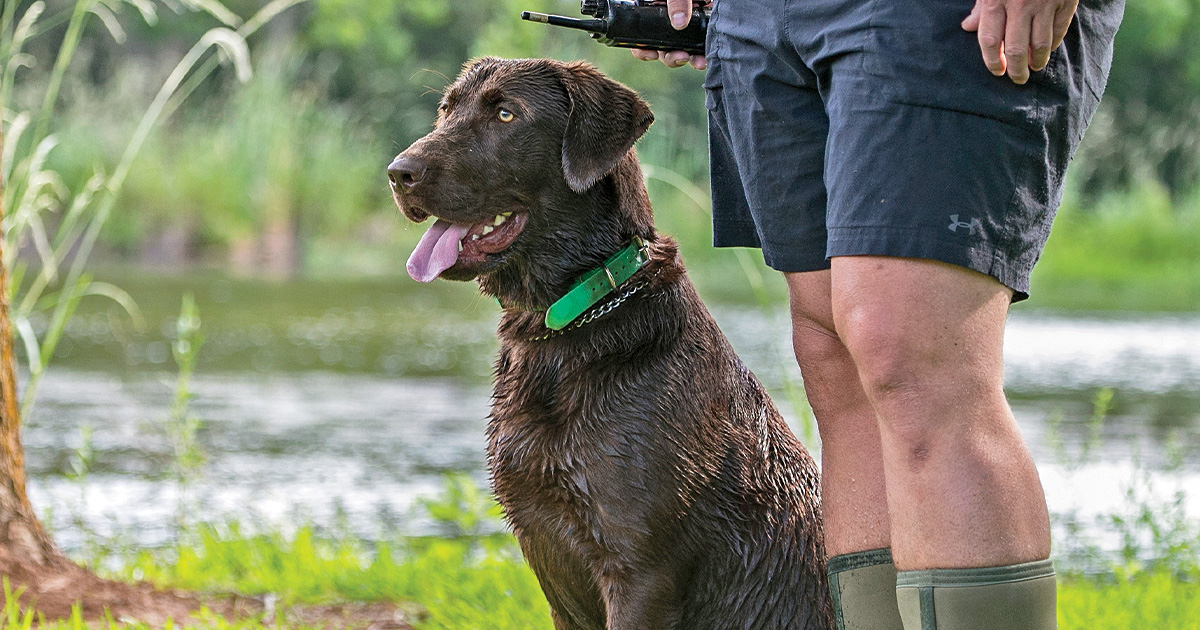Retrievers: The Legend
Rex Carr had extraordinary influence on the art and science of retriever training
Rex Carr had extraordinary influence on the art and science of retriever training

Legendary retriever trainer Rex Carr is best known for pioneering the use of electronic collars, but he was equally influential in developing drills and other training techniques to help dogs reach their full potential.
While recovering from wounds sustained at the battle of Okinawa, Rex Carr happened to read a Life magazine story about retrievers. The story was written by Paul Bakewell, the St. Louis sportsman whose dogs included Shed of Arden, one of only two three-time winners of the National Retriever Championship. Growing up in North Dakota, Carr had kept pets of every description and trained them to do astonishing things—rabbits would follow him home, pigeons would sit on his head—but it wasn’t until he read the Bakewell piece that, in his words, he got “all cranked up about retrievers.”
He settled in Escalon, California, bought a Lab that he named Rip, and, after training Rip to do pretty much whatever he wanted him to do, hung out his shingle as a pro. Early on he trained hunting dogs. The mere fact that he could get dogs to respond to whistles and hand signals—all but unheard of then—brought clients in droves to his Carr-Lab Kennels. But after attending his first field trial circa 1948, he resolved to narrow his focus. “I didn’t want to be a country doctor,” Carr recalled many years later. “I wanted to be a specialist.”
Carr was more specialized than most. He trained dogs for field trial competition, but he didn’t handle them. Instead, he trained their owners to handle them. This set him apart from every other pro in the business and, as Carr’s stature grew, transformed tiny Escalon into a destination for the retriever faithful.
Carr was firm but fair with dogs, but he could be fierce with their owners. Dave Rorem, the esteemed Minnesota pro who was a close friend of Carr’s, doesn’t dispute this. “He was a tough, tough coach,” Rorem acknowledges. “The thing Rex had no tolerance for was mediocrity. If you came to Rex’s and gave what he considered a mediocre effort, he’d eat you alive. But if you came with the attitude ‘I want to learn and I’ll do whatever it takes,’ he’d give you everything he had to make you a better trainer and handler.”
When the Carr-trained Super Chief won the 1968 National Retriever Championship, it marked a watershed moment in the evolution of retriever field trials and retriever training. For the next two decades, dogs and handlers trained by Carr dominated competitions. The Carr training program, which relied on an electronic collar to apply pressure and enforce corrections at long range, gradually but inexorably swept the field.
Carr had been exploring the possibilities of “electronic training” since the early 1950s, when he improvised a rudimentary e-collar using a six-volt battery, a doorbell buzzer, and a wire connecting a couple of electrodes to a standard collar. Later he worked with the fledgling e-collar manufacturers of the day, testing their products by holding them in his hand and triggering the juice.
“Godalmighty!” Carr recalled in Boyd Gibbons’s 1992 book The Retriever Game. “It was risky using those early collars. They were so crude, always malfunctioning. A motorcycle going by or an airplane flying over would set them off . . . but of course it was necessary for someone to pioneer.”
That is how Carr, who died in 2002, is chiefly remembered today—as the father of the electronic collar. Carr’s identification with the collar has become so prominent, in fact, that it has obscured—and in a sense diminished—his own abilities and accomplishments.
“Rex was head and shoulders above any other dog man I’ve ever known,” Rorem attests. “His dog-reading skills were so extraordinary; he knew what the dog was going to do before the dog did. He left no stone unturned in his search to come up with drills that maximized the dog’s potential, and that’s what made him so good. Almost everything that most trainers today do is based on something that began with Rex. All the basics, all the fundamentals, all the marking drills—Rex is the one who developed 99 percent of that. I don’t think there’s any question that he’s the most influential trainer of my lifetime, if not of all time.”
Ducks Unlimited uses cookies to enhance your browsing experience, optimize site functionality, analyze traffic, and deliver personalized advertising through third parties. By continuing to use this site, you agree to our use of cookies. View Privacy Policy